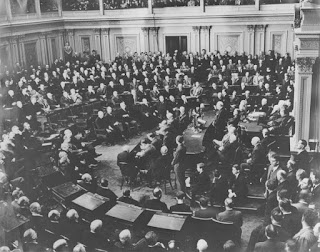Servant of God Isaac Hecker was born, here in New York City, 202 years ago today, on December 18, 1819. Like so many New Yorkers, now as then, Isaac was the son of immigrant parents. And, like an increasing number of young Americans now, he apparently received little formal religious instruction in his youth. Such at least was his claim in an account of his life, which he wrote in Rome in 1858, a state of affairs he characterized as typical in the United States at that time.
With or without formal religious instruction, however, Hecker grew up in a society still Christian in its ambience and in its publicly professed morality. Moreover, it is at least likely that he attended at least some Sunday services with his devout Methodist mother. Methodism was then the largest religious group in the country. It was also, in George McKenna's words, “a religion of the upward aspiring at a time when ‘self improvement’ was itself almost a religion.” And, from an early age, Hecker had internalized a belief in God’s special providence – that God had a providential plan for his life. (This is reflected in the first of the six images at the base of Fr. Hecker’s sarcophagus in Saint Paul the Apostle Church in New York City, which shows Isaac as a sick child, in danger of death from smallpox, reassuring his mother: “No, mother, I shall not die now; God has work for me to do in the world, and I shall live to do it.”)
Hecker briefly attended a local New York City Public School, but his formal education ended early when as many of his contemporaries he needed to go to work. (His limited education, however, hardly suggested the profundity of his future thinking.) Meanwhile, his father’s failure to provide for his family had effectively transferred that responsibility to Isaac’s two older brothers, John and George, who became bakers and eventually owned four shops and their own flour mill. Isaac joined his brothers as baker and delivery boy. (Thus, the second image at the base of Hecker’s sarcophagus shows him as a young man along the Hudson River wharves delivering bread from his brothers’ bakery.)
Even then, however, Hecker was asking big picture questions about the direction of his life. "What does God desire from me? What shall I attain unto Him? What is it He has sent me into the world to do?" Fortunately, “Hecker and Brothers, Makers of Hecker Flour” had become a successful, quite prosperous business, and the Hecker brothers became sufficiently wealthy to be able to support Isaac in his increasing attention to his spiritual search.
The Hecker brothers were also very actively involved in Jacksonian-era New York Democratic Party politics, and John Hecker was one of the leaders of the Locofocos, a pro-reform faction. In his 1858 narrative of his life, Isaac recalled how he initially viewed political reform as "the remedy for existing evils and of rendering mankind happy." Isaac remained committed to the ideals of Jacksonian democracy even after American politics had long since evolved beyond that, but his priorities quickly evolved from political to social to religious concerns.
This was, after all, the era known as the "Second Great Awakening." Hecker took time examining his religious options, sampling as many as possible of the leading contemporary religious ideas, none of which, however, answered the demands of his reason or proved satisfactory to his conscience - until, as he put it, "The Catholic Church burst upon my vision as the object to which all my efforts had been unintentionally directed. It was not a change, but a sudden realization of all that had hitherto obscurely captivated my mind, and secretly attracted my heart". In thus describing his spiritual quest and its seemingly surprising outcome, Hecker wanted to emphasize what would become his lifelong conviction that Catholicism was consistent with and indeed the true fulfillment of the aspirations of human nature – a 19th century version of the theme of St. Augustine’s Confessions: “You have made us for yourself, O Lord, and our heart is restless until it rests in you.”
En route to finding his home in the Catholic church, Hecker had come under the influence of Orestes Brownson (1803-1876), and Brownson's emphasis on the social dimension of religion. When Hecker first heard Brownson lecture in New York in early 1841, he was a prominent Unitarian minister, journalist, and active social reformer. Hecker and Brownson would soon become perhaps the two most influential 19th century American converts to Catholicism.
The third image at the base of Hecker’s sarcophagus shows him searching for God at Brook Farm – a transcendentalist, utopian community, founded in West Roxbury, Massachusetts by Brownson’s friend George Ripley in 1841. New England Transcendentalism had its roots in the Unitarian rejection of classical Calvinist doctrine and orthodox Christianity in general – what Hecker later characterized as “a gradual loosening of the Christian principles in men’s minds and a falling away into general scepticism.”
A smart, if relatively uneducated, working-class young man, Hecker was excited to enter this elite community and participate in its intellectual life. This transcendentalist environment was quite conducive to Hecker’s intense preoccupation with exploring his inner life, and his companions nicknamed him “Ernest the Seeker,” the name of a character in a contemporary short story by William Henry Channing. Hecker certainly absorbed the Transcendentalists’ critique of mainline New England Protestantism. “Against Calvinism we had a particular grudge,” he later recalled.” To the end, he would critique “the Calvinistic error that nature and man are totally corrupt.”
Yet, while benefiting from an environment that encouraged him to value and explore his inner life, Hecker - in part, perhaps, because of the class difference - consistently maintained a certain intellectual independence from the beliefs of the Transcendentalists, thus enabling his exploration of his soul to lead to conclusions quite different from what the Transcendentalists believed. “I don’t know,” he wrote in 1843, “but that I will be unable to become one of the Community. In their life it is clear that they commune with different kind of objects from what I do.”
As he came to understand his inner spiritual experience in terms of the action of the Holy Spirit, he found himself more and more drawn to institutional Christianity. His early identification of Divine Providence with the indwelling Holy Spirit made theological sense of the continuity between nature and grace, which he felt from his own experience, thus easing his way into the Church and laying the groundwork for his mature thought about the relationship between Church and society and the evangelization of the latter by the former.
As Hecker continued his inner exploration and comparative study of different churches, he studied the Catechism of the Council of Trent (The Roman Catechism) and was especially impressed by Article IX on the doctrine of the communion of saints. Writing in the Paulist magazine, The Catholic World, one year before his death, Hecker recalled:
"When, in 1843, I first read in the catechism of the Council of Trent the doctrine of the communion of saints, it went right home. It alone was to me a heavier weight on the Catholic side of the scales than the best historical argument which could be presented. … The certainty of the distinctively Catholic doctrine of the union of God and men made the institution of the church by Christ exceedingly probable.
Finally, he was received into into the Roman Catholic Church at New York's original Saint Patrick's Cathedral on August 1, 1844. Subsequently, he and his brother George, who had followed Isaac into the Church, were both confirmed on May 18, 1845.
Like Christian history’s most famous seeker, Saint Augustine, Hecker had examined the leading intellectual and religious currents of his time, paying intense attention to his own inner spiritual sensibility, before finally finding a permanent home in the Roman Catholic Church. In our contemporary idiom, Hecker was “spiritual but not religious” for much of the first 25 years of his life. The very personal story of his spiritual search, of his intense attention to his own inner spiritual sense, eloquently exemplifies the perennially human appeal of such a spiritual search and certainly speaks to the spiritual longings of some in our own (admittedly more secular) society today. What was significant about Hecker’s “spiritual but not religious” period, however, was that he did not remain that way. For Hecker, seeking was never an end in itself. The point of seeking was finding. Once the object was found, the search ended. Having found fulfillment in the Catholic Church, he never desired to look farther. Rather, he desired to devote his life to helping others – especially other seekers, such as he himself had been – to find the truth in the Catholic Church. Hecker’s enthusiasm for his new faith and his commitment to the Church would permeate all his subsequent activities – from his initial conversion experience as recorded in his Diary, through his active ministry as a priest and missionary preacher, to his final mature exposition in his last book, The Church and the Age.
In this first phase of his life, Hecker, animated by an increasingly conscious appreciation of God’s Providence, had opened himself to be guided by the Holy Spirit, whose presence and action he discerned in God’s care for him, and through that experience he recognized the grace to attach himself to the Roman Catholic Church for the rest of his life. Himself a product of the religious fragmentation of American society, but drawn by God’s providential grace to seek the light of truth and find it in the unity of the Catholic Church, he then committed himself completely to share what he had found with others similarly inspired to seek and to find, and to whom his story continues to speak. All his diverse pastoral and missionary efforts and accomplishments would remain rooted in his abiding trust in God’s presence and action in his own life and in the world in which he lived. His conversion was complete, and his spirituality was generously and determinedly evangelizing – expressing a prayerful, lifelong, intimate dedication to and cooperation with God’s design for human beings.
Reflecting upon his experience many years later, Hecker wrote that he “not only became a most firm believer in the mysteries of the Christian religion, but a priest and a religious, hopes thus to die.”













